

Angleterre en faillite. Stock market shifts mean Britain is under foreign ownership. Britain is not up for sale.
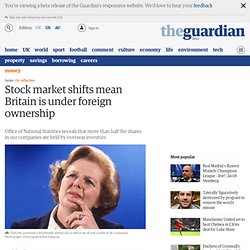
It has been sold already. Extraordinary figures from the Office of National Statistics this week reveal that, for the first time, more than half of the shares in Britain's companies are now owned by foreigners. The transformation in the ownership of Britain's biggest companies, once controlled by the great pension and insurance companies such as Prudential and Pearl on behalf of small savers, has been swift and dramatic. Le classement des villes où vivent le plus de milliardaires. Xerfi Canal Jean-Michel Quatrepoint Impôts en France : les américains doivent payer aussi. Banque d'Angleterre. Un article de Wikipédia, l'encyclopédie libre.
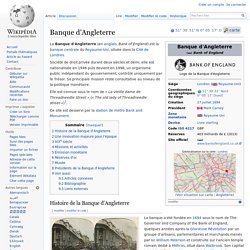
La Banque d'Angleterre (en anglais, Bank of England) est la banque centrale du Royaume-Uni, située dans la Cité de Londres. Société de droit privée durant deux siècles et demi, elle est nationalisée en 1946 puis devient en 1998, un organisme public indépendant du gouvernement, contrôlé uniquement par le Trésor. Sa principale mission reste consultative au niveau de la politique monétaire. Elle est connue sous le nom de « La vieille dame de Threadneedle Street » (« The old lady of Threadneedle street »)[1]. Histoire de la Banque d'Angleterre[modifier | modifier le code] La Banque d'Angleterre vers 1890-1900.
La banque a été fondée en 1694 sous le nom de The Governor and Company of the Bank of England, quelques années après la Glorieuse Révolution par un groupe d'artisans, parlementaires et marchands menés par sir William Paterson et construite sur l'ancien temple romain dédié à Mithras, situé dans Walbrook. XIXe siècle[modifier | modifier le code] Bank of England. The Bank of England, formally the Governor and Company of the Bank of England, is the central bank of the United Kingdom and the model on which most modern central banks have been based.
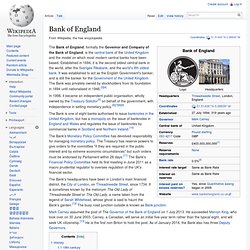
Established in 1694, it is the second oldest central bank in the world, after the Sveriges Riksbank, and the world's 8th oldest bank. It was established to act as the English Government's banker, and is still the banker for the Government of the United Kingdom. The Bank was privately owned by stockholders from its foundation in 1694 until nationalised in 1946.[3][4] In 1998, it became an independent public organisation, wholly owned by the Treasury Solicitor[5] on behalf of the government, with independence in setting monetary policy.[6][7][8][9] The Bank is one of eight banks authorised to issue banknotes in the United Kingdom, but has a monopoly on the issue of banknotes in England and Wales and regulates the issue of banknotes by commercial banks in Scotland and Northern Ireland.[10] History[edit]
List of directors of the Bank of England. List of directors of the Bank of England From Wikipedia, the free encyclopedia Jump to: navigation, search This list is incomplete; you can help by expanding it.
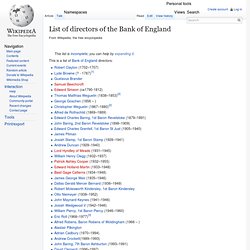
This is a list of Bank of England directors: References[edit] Retrieved from " Categories: Hidden categories: Incomplete lists from August 2008 Navigation menu Personal tools Namespaces Variants Views Actions. Montagu Norman, 1st Baron Norman. Montagu Collet Norman, 1st Baron Norman DSO PC (6 September 1871 – 4 February 1950) was an English banker, best known for his role as the Governor of the Bank of England from 1920 to 1944.
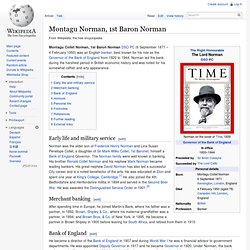
Norman led the bank during the harshest period in British economic history and was noted for his somewhat raffish and arty appearance. Early life and military service[edit] Merchant banking[edit] After spending time in Europe, he joined Martin's Bank, where his father was a partner, in 1892, Brown, Shipley & Co., where his maternal grandfather was a partner, in 1894, and Brown Bros. & Co. of New York, in 1895. He became a partner in Brown Shipley in 1900 before leaving for South Africa, and retired from them in 1915. Bank of England[edit] He became a director of the Bank of England in 1907 and during World War I he was a financial advisor to government departments. N Montagu / Times Magazine 1929. The Bank of England told us to do it, claims Barclays. Manipulation des taux interbancaires Libor et Euribor. LA CITY - LA FINANCE EN EAUX TROUBLES.